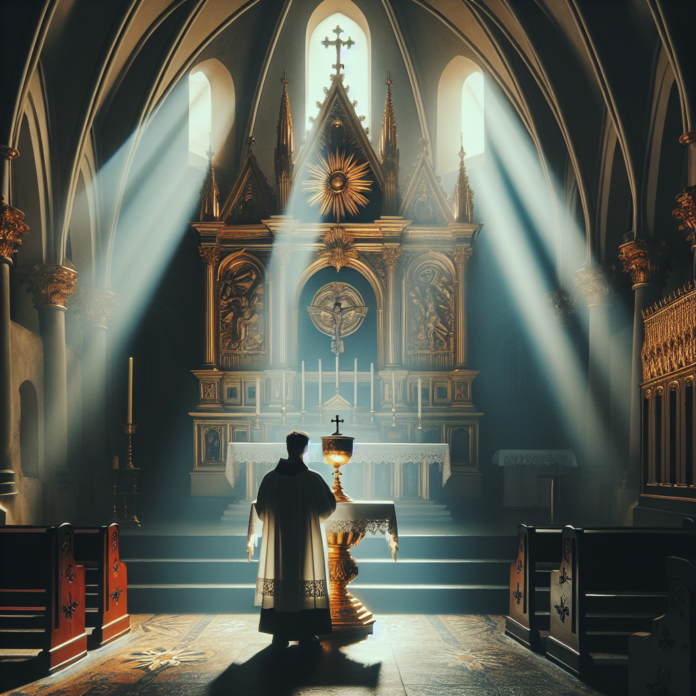In the intricate dance of faith and politics, the role of Catholic priests has historically been pivotal, and as the modern world advances, their influence continues to shape societal norms and policies. The poignant interplay between tradition and innovation often places priests at a crossroads: should they uphold the immutable tenets of the past or adapt to the evolving needs of contemporary society? This query becomes even more critical when examining Catholic politics, where the balance between progressive values and traditionalism is constantly being renegotiated.
Throughout history, the political engagement of Catholic clergy has been both deliberate and profound. From the medieval power dynamics where popes wielded significant political influence to the active involvement of priests in social justice movements in more recent times, the alignment between faith and governance has been unmistakable. Yet, this alliance has not been without controversy. The traditionalist faction within the Church often sees itself as the custodian of immutable truths, a bulwark against the perceived encroachments of modernity. This is most evident in their staunch advocacy for the Latin Mass, a practice which Pope Francis has sought to regulate in favor of more inclusive liturgical expressions.
The Latin Mass has long been a symbol of Catholic traditionalism, rooted deeply in pre-Vatican II theology. Its defenders argue that it preserves the sacred mysteries of the Church and connects worshippers with a timeless spirituality. However, this perspective is not universally shared within the Catholic community. Critics of the Latin Mass point out that its exclusivity often alienates the faithful rather than drawing them nearer to the divine. Pope Francis, keen on promoting a more accessible and pastoral Church, has instituted measures to limit the use of the Latin Mass, recognizing that the rigid adherence to tradition may impede the Church’s mission to resonate with contemporary believers’ lives.
Pope Francis’s tenure has been marked by an unmistakable shift towards progressive values. His call for a “Church for the poor” and his outspoken stance on issues such as climate change, social justice, and the inclusivity of marginalized groups highlight a vision that seeks relevance in the modern era. This progressive trajectory represents a compassionate approach, advocating for policies that prioritize human dignity and social equity. Under his guidance, many priests strive to emulate this ethos, becoming champions of change within their communities.
This shift towards progressivism is not merely a departure from tradition but a deliberate return to the core Christian values of love, compassion, and justice. The clergy, as spiritual leaders, are recognizing the imperative to address the urgent challenges facing the world today, from economic inequality to environmental degradation. By engaging in politics with these values at the forefront, they seek to create a more just and equitable society. This vision, however, often puts them at odds with the more conservative elements within the Church who cling to hierarchical and doctrinal purity.
The divergence between traditionalism and progressivism in Catholic politics is starkly visible in the contentious debates surrounding social issues. On topics such as LGBTQ+ rights, the role of women in the Church, and reproductive health, traditionalists often invoke doctrinal rigidity, while progressives, inspired by Pope Francis’s inclusive message, advocate for compassionate reform. The tensions that arise from these discordances are not merely academic; they bear real consequences on the lives of the faithful.
Consider the case of LGBTQ+ rights. Traditionalist perspectives within the Church often uphold a view that eschews full acceptance, leading to policies that can marginalize and alienate. In contrast, progressive priests, inspired by the Pope’s inclusive vision, work towards creating a welcoming environment for all, recognizing the inherent dignity and worth of every individual. This approach does not seek to undermine the Church’s teachings but rather to reinterpret them in a manner that promotes love and acceptance.
Similarly, on the issue of women’s roles within the Church, progressives argue for expanded participation and leadership opportunities. This perspective is not a departure from tradition but a recognition of the evolving understanding of equality and justice. Pope Francis himself has called for increased roles for women, stating that the Church cannot fully function without their involvement. This progressive stance offers a path towards a more inclusive and equitable Church, one that resonates with the broader societal push towards gender equality.
The role of priests in Catholic politics, therefore, becomes one of stewardship, not just of ancient traditions, but of an evolving faith that seeks relevance in a changing world. By engaging in politics through the lens of progressive values, they act as agents of transformation, advocating for policies that uphold the dignity and welfare of all individuals. This approach brings the Church closer to the essence of its mission, aligning more closely with Christ’s message of love, compassion, and justice.
In conclusion, the ongoing tension between traditionalism and progressivism in Catholic politics is indicative of a broader struggle within the Church: to remain anchored in its rich heritage while navigating the challenges of the modern world. Priests, as mediators of this dynamic, have the crucial task of discerning a path that honors both the timeless truths of their faith and the pressing needs of contemporary society. By championing progressive values in their political engagement, they not only align with Pope Francis’ vision for the Church but also contribute to a more just and compassionate world.
